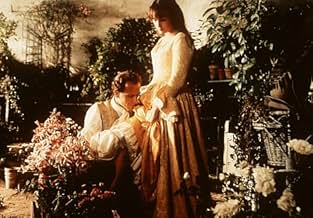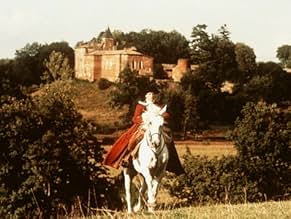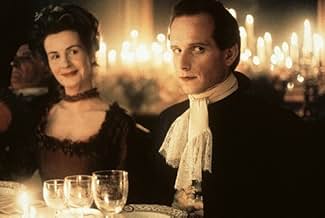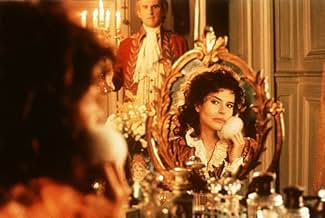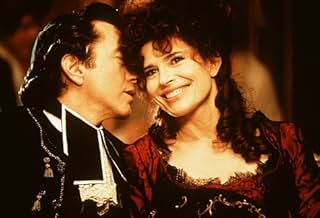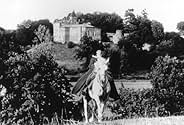VALUTAZIONE IMDb
7,3/10
8418
LA TUA VALUTAZIONE
Aggiungi una trama nella tua linguaTo get royal backing on a needed drainage project, a poor French lord must learn to play the delicate games of wit at court at Versailles.To get royal backing on a needed drainage project, a poor French lord must learn to play the delicate games of wit at court at Versailles.To get royal backing on a needed drainage project, a poor French lord must learn to play the delicate games of wit at court at Versailles.
- Regia
- Sceneggiatura
- Star
- Candidato a 1 Oscar
- 20 vittorie e 17 candidature totali
Judith Godrèche
- Mathilde
- (as Judith Godreche)
Recensioni in evidenza
RIDICULE deserved all the lavish praise it engendered upon its release in 1996. As a period piece (France in the final throes of King Louis XVI) it is one of the finest - visually, contextually, musically, AND it is wonderfully intelligent! Unlike many period pieces that serve as elegant decoration for meager stories, RIDICULE carries pungent statements about the decline of aristocracy and the whispers of the cause of democracy.
A poor humanitarian travels from the ill swamps of Southern France to the court of Versailles to seek funding from the Royal Court to correct the deplorable living conditions ignored by the King. Upon arrival he finds a vapid society diverting attention from problems that plague the kingdom by inventing word games whose purpose is to find who can is best able to ridicule the fellow shallow players of this verbal chess game. Finding he has the gift to outclass the court with his verbal wit our humanitarian is 'accepted' into nobility and spars with the finest. For a while our humanitarian's focus is diffused by women, duels, and other diversions of the court until he finally regroups his cause and returns to the suffering sector from whence he came...with the ability to correct the conditions at last.
The cast of Director Patrice Laconte's gem is exemplary and includes such fine actors as Charles Berling, Fanny Ardant, Jean Rochefort, Judith Godrèche, Bernard Giraudeau, and the mute role so sensitively performed by Bruno Zanardi (the one constant presence who keeps us reminded of just how absurdly low the court of France has fallen). The costumes by Christian Gasc (especially in the masked ball) are some of the more sumptuous ever created and the musical score by Antoine Duhamel and cinematography by Thierry Arbogast capture the atmosphere of both comedy and underling decay that makes this film so fine.
Truly a film for those who enjoy double entendres and acerbic wit, this film grows better with repeated viewings. In French with English subtitles. Grady Harp
A poor humanitarian travels from the ill swamps of Southern France to the court of Versailles to seek funding from the Royal Court to correct the deplorable living conditions ignored by the King. Upon arrival he finds a vapid society diverting attention from problems that plague the kingdom by inventing word games whose purpose is to find who can is best able to ridicule the fellow shallow players of this verbal chess game. Finding he has the gift to outclass the court with his verbal wit our humanitarian is 'accepted' into nobility and spars with the finest. For a while our humanitarian's focus is diffused by women, duels, and other diversions of the court until he finally regroups his cause and returns to the suffering sector from whence he came...with the ability to correct the conditions at last.
The cast of Director Patrice Laconte's gem is exemplary and includes such fine actors as Charles Berling, Fanny Ardant, Jean Rochefort, Judith Godrèche, Bernard Giraudeau, and the mute role so sensitively performed by Bruno Zanardi (the one constant presence who keeps us reminded of just how absurdly low the court of France has fallen). The costumes by Christian Gasc (especially in the masked ball) are some of the more sumptuous ever created and the musical score by Antoine Duhamel and cinematography by Thierry Arbogast capture the atmosphere of both comedy and underling decay that makes this film so fine.
Truly a film for those who enjoy double entendres and acerbic wit, this film grows better with repeated viewings. In French with English subtitles. Grady Harp
I have to say that this film is certainly not for an audience with a predilection for sophomoric or low-brow "hu-mah". The action in this film is nearly entirely a matter of verbal cut and thrust and quick repartee. A period piece shot in pre-revolutionary France in the days of King Louis and Marie Antoinette, Ridicule portrays an era when wit could earn a passport into courtly favor, and one verbal faux pas could ruin a man's reputation and position in society. Charles Berling's performance as Ponceledon, the rustic nobleman trying to bring his petition to drain the disease-infested swamps of his region before the King of France, is in a word, superb... Fanny Ardant is also a well-cast Madame de Blayac, the dexterously duplicitous countess who appears disposed towards aiding Ponceledon in his suit. Ridicule is a genuinely delightful comedy. I recommend it highly even to those who do not speak French. My rating: 9/10.
"Ridicule" confirms well a thing: Patrice Leconte is one of the most talented French film-makers that French cinema has known. His gift comes from the fact that ke knows how to find original and eye-catching subjects for his movies and he also knows how to make them fascinating (watch "mister Hire" or "the hairdresser's wife" to be aware of it).
Here, he chose to broach a make his movie around a feeling that men always dreaded: ridicule. The action takes place in 1780, in the reign of Louis XVI. A young noble (Charles Berling) intends to get a meeting with the king, in Versailles. Indeed, he'd like him to lend important sums of money so as to drain marshes infected by mosquitos. This action will enable to save hundreds of peasants. But what Berling doesn't know is that he's not the only one who wants to get a meeting with the king. Hundreds of nobles like him feel the same thing. Above all, according to an elderly noble (Jean Rochefort), when you're in the court of a king, you have to avoid the ridicule which consequences can be disastrous. Berling will learn it, will face it and will just avoid it.
You could compare the court of Louis XVI as a jungle where only the strong survive. The strong are those who are quick-witted and skillful-minded. Ridicule invades the weak and leads them to disgrace, even suicide. With this movie, Leconte's aim is at denouncing vanity and hypocrisy of courtiers in the court of the king who take advantage of their privileged situation.
An outstanding and precise film-making, a dazzling performance especially Jean Rochefort and some powerful cues ("now, you mustn't make a single mistake" said Rochefort to Berling when the last one's going to meet the king). Obviously, the movie doesn't lack ironical humor: when the king asks to a courtier: "I hope it's not a pun" and the courtier replies: "no, Sir, it's a play on words". Play on words and pun mean the same thing.
At the end, a brilliant movie rightly awarded in France where it won the Oscar for the Best movie in 1997
Here, he chose to broach a make his movie around a feeling that men always dreaded: ridicule. The action takes place in 1780, in the reign of Louis XVI. A young noble (Charles Berling) intends to get a meeting with the king, in Versailles. Indeed, he'd like him to lend important sums of money so as to drain marshes infected by mosquitos. This action will enable to save hundreds of peasants. But what Berling doesn't know is that he's not the only one who wants to get a meeting with the king. Hundreds of nobles like him feel the same thing. Above all, according to an elderly noble (Jean Rochefort), when you're in the court of a king, you have to avoid the ridicule which consequences can be disastrous. Berling will learn it, will face it and will just avoid it.
You could compare the court of Louis XVI as a jungle where only the strong survive. The strong are those who are quick-witted and skillful-minded. Ridicule invades the weak and leads them to disgrace, even suicide. With this movie, Leconte's aim is at denouncing vanity and hypocrisy of courtiers in the court of the king who take advantage of their privileged situation.
An outstanding and precise film-making, a dazzling performance especially Jean Rochefort and some powerful cues ("now, you mustn't make a single mistake" said Rochefort to Berling when the last one's going to meet the king). Obviously, the movie doesn't lack ironical humor: when the king asks to a courtier: "I hope it's not a pun" and the courtier replies: "no, Sir, it's a play on words". Play on words and pun mean the same thing.
At the end, a brilliant movie rightly awarded in France where it won the Oscar for the Best movie in 1997
I must say that I wish I could speak better French, simply because this film has such a great sense of humor, it would only intensify the hilarity of the picture. The story was not perhaps the most original, then again, what is? This film had heart and a flow about it that was very interesting and pleasing to the eye and soul. Sometimes I hoped that I could see the lives of the other people in the plot, like that little deaf/mute boy, Paul or whatever happened to the abbot? Overall, I must say that the film is beautifully shot, funny in a very literary, upper minded way and a sheer delight. Not for those with a taste for low-brow humor however.
10moulya
Patrice Leconte's most achieved feature. The scenario mixes wit, cruelty, finest ferocious humor, politics and romance with a rare balance. Rhythm is fast, and the movie is served by a wonderful cast (many actors are among the best stage actors in France), notably main character Charles Berling and Bernard Gireaudeau's abbe de Villecourt. Jean Rochefort's supporting performance is outstanding, as is the impersonation of a Versailles court's bird of prey by Fanny Ardant. All in all, i.m.h.o., one of the best French movies of the 90s.
Lo sapevi?
- QuizIt is worth noting the presence of a real historical figure, father Charles Michel de l'Épée. The abbot de l'Épée was one of the first to take an interest in the issue of public education for the deaf, giving priority to sign language as a language of instruction.
- BlooperAround 44 min, when Grégoire is talking with Madame de Blayac, her left hand is touching the table, but in the next shot it's just hanging on the chair's the armrest.
- Citazioni
Gregoire Ponceludon de Malavoy: Peasants feed aristocrats as well as mosquitoes.
I più visti
Accedi per valutare e creare un elenco di titoli salvati per ottenere consigli personalizzati
- How long is Ridicule?Powered by Alexa
Dettagli
- Data di uscita
- Paese di origine
- Lingua
- Celebre anche come
- Насмішка
- Luoghi delle riprese
- Parc du Château de Versailles, Versailles, Yvelines, Francia(palace garden and ponds)
- Aziende produttrici
- Vedi altri crediti dell’azienda su IMDbPro
Botteghino
- Budget
- 50.000.000 FRF (previsto)
- Lordo Stati Uniti e Canada
- 1.979.768 USD
- Lordo in tutto il mondo
- 1.979.768 USD
Contribuisci a questa pagina
Suggerisci una modifica o aggiungi i contenuti mancanti



